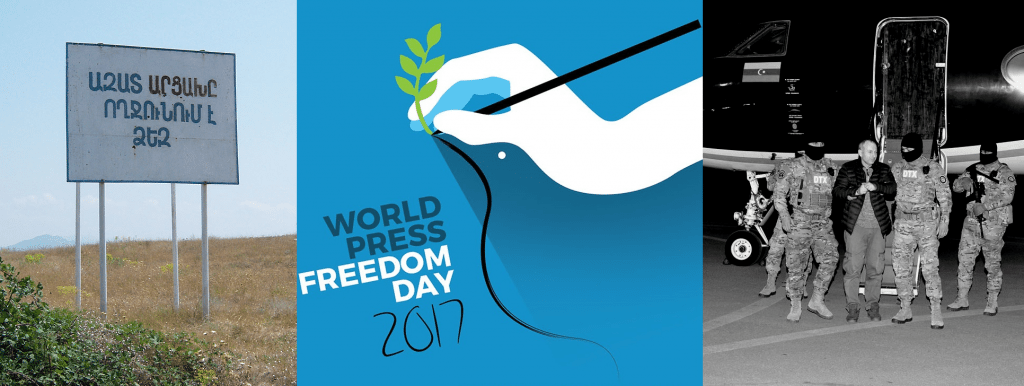This morning, I woke up to a Facebook post made by Artsakh Ombudsman (Human Rights Defender) Ruben Melikyan, congratulating me and other fellow journalists on the occasion of World Press Freedom Day—a UN-designated day meant to raise awareness of the importance of freedom of the press and remind governments of their responsibility to respect and defend the right to freedom of expression outlined in the Universal Declaration of Human Rights.

A sign welcomes visitors to a free Artsakh (L), while journalist Alexander Lapshin is detained in Baku (R)
“Freedom of expression and press freedom are the two fundamental pillars, which set healthy societies apart from unhealthy ones,” a part of the congratulatory post read, roughly translated.
The Ombudsman’s message came on the same day Amnesty International condemned Turkey’s ongoing crackdown on freedom of expression, and its continued campaign of sweeping arrests and detainment of more than 120 journalists throughout the country.
“Since the failed coup attempt in July 2016, at least 156 media outlets have been shut down and an estimated 2,500 journalists and other media workers have lost their jobs. Journalists have been arrested and charged with terrorism offences as a result of posts they have shared on Twitter, cartoons they have drawn, or opinions they expressed. This is taking place within the context of a wider crackdown against perceived government critics which has seen 47,000 people remanded in prison and more than 100,000 public sector employees summarily dismissed,” read a part of the statement released by the human rights organization.
Just four days ago, on April 29, access to the free online encyclopedia Wikipedia was blocked by the country. Turkey’s Ministry of Transport, Maritime Affairs and Communications, announced that the site was blocked for becoming an information source “acting with groups conducting a smear campaign against Turkey in the international arena.”
This was just the latest example of Turkey’s unrelenting suppression on free expression and free speech.
In nearby Azerbaijan—whose government continues to fire on Armenian soldiers and civilians in the country from which the Ombudsman congratulated us—the tradition of media mistreatment is just as grim. Baku’s dangerous sensitivity to any and all criticism not only continues to persist, but seems to get progressively worse year after year (think Alexander Lapshin).
According to the latest World Press Freedom Index published by Reporters Without Borders, Azerbaijan is ranked 162nd, while Turkey is ranked 155th out of 180 nations. Armenia—though far from perfect—sits at 79 on the index, which ranks the level of freedom available to journalists in each country.
Under the tag-team dictatorship of President Ilham Aliyev and his Vice President wife Mehriban Aliyeva—who continue to extend their power and increase their vast personal wealth—freedoms of expression, assembly, and association have not only deteriorated, they have practically become extinct within the country.
Instead of making threats that it will one day “reclaim” Artsakh, the Aliyev regime should perhaps take a few lessons on good governance from the small, unrecognized, but highly democratic state, which fosters and upholds the very same freedoms Azerbaijan and Turkey so vehemently deny its own citizens.
Amnesty International’s motto is “It is better to light a candle than to curse the darkness.” On this World Press Freedom Day, it is clear that Artsakh continues to be a beacon of light in an otherwise dark region.
Source: Armenian Weekly
Link: The Difference Between Light and Darkness on World Press Freedom Day
